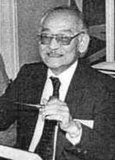Portal:Oregon/Selected biography/22
Minoru "Min" Yasui (October 19, 1916 – November 12, 1986) was a Japanese-American lawyer from Oregon. Born in Hood River, Oregon, in the Columbia River Gorge, he earned both an undergraduate degree and his law degree at the University of Oregon in the 1930s. He was one of the few Japanese Americans after the bombing of Pearl Harbor who fought the laws that directly targeted Japanese Americans or Japanese immigrants. His case was the first case to test the constitutionality of the curfews targeted at minority groups. His case would make its way from the United States District Court for the District of Oregon to the United States Supreme Court, where his conviction for breaking the military imposed curfew was affirmed. His case Yasui v. United States, was a companion case to Hirabayashi v. United States. After internment during most of World War II, he moved to Denver, Colorado in 1944. In 1945, Yasui married, and with his wife raised three daughters. In Denver, he became a local leader in civic affairs, including leadership positions in the Japanese American Citizens League. In 1986, his criminal conviction was overturned by the federal court in Oregon.

